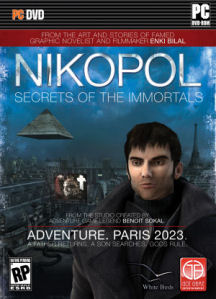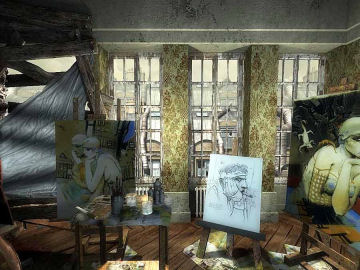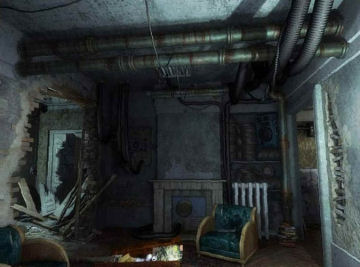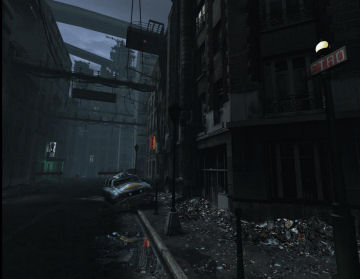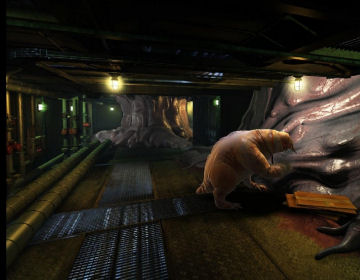|
Nikopol - Secrets of the Immortals
GameBoomers Interviews Michel Bams, Co-founder of White Birds Productions
By Looney4Labs
Nikopol: Secrets of the Immortals is an upcoming game produced by one of our favorite studios, White Birds Productions. It is based on the graphic novels by Enki Bilal. Set in Paris of 2023, this is the story of one man’s search for his father in the face of danger and political intrigue.
First, I’d like to thank you so much for taking your time to tell us more about this game and the development process.
No problem. It is always a pleasure to answer an interview, especially when the questions are good, like yours. Many thanks for your kind words about our studio.
What was it about the Nikopol series that moved you to build a game around it?
First of all, it is a great story! Bilal created a fabulous scenario and it was perfect for an adventure game, whether the player knows about the original graphic novel or not. Olivier Fontenay and I had bought the original story at its first publication, years ago, and always admired Enki Bilal’s work. So, when we had the opportunity of working with him, we immediately thought of proposing an adaptation.
What type of person is the main character, and what motivates him?
He is a mere mortal, an unknown artist, trying to survive in this fascist state that became the City of Paris. He knows that his father was condemned years ago to cryogenic exile, and all he has are old movies of him. His mother died when he was still a child. At the beginning of the game, he has no other motivation than his usual life, then his father’s cryogenic capsule comes back to Earth and…the story starts!
On the White Birds website, I found this statement: “White Birds uses images to invent and to tell stories.” Does this mean that the graphics are given precedence over other game elements?
In our mind, it means that we think of ourselves as “storytellers, using 3D images.” We believe in stories, this is why we’re focusing on adventure games rather than “action.” For us, a player of one of our games should be close to a novel reader or a movie watcher, asking himself/herself: “What’s coming next”?
Is the ambiance of the game as dark and brooding as the screenshots seem to suggest? What was your inspiration in creating the various elements of this futuristic universe? Does the game use a first or third person perspective?
The game is first person. The ambiance is a re-creation of Bilal’s universe. He wanted something very dark, but with small touches of humor. The challenge for our 3D artists was to adapt an existing universe, originally designed for a graphic novel, giving it a real existence on its own but keeping the “spirit” of it. I have to say, without wishing to be pretentious, that we are happy with the result. Our main satisfaction was to see Enki Bilal approve everything.
The website says this will be the first game in a series. Does this first game reflect the first novel, or is the story new?
The original story was published in three graphic novel volumes. We have adapted the first one. If the game is successful – and we hope it will be – we will continue the series.
Will the game be self-contained and complete? Or will it be the first installment of a larger story, leaving some elements of the plot unresolved?
The game has a real ending, as the original graphic novel had. When Bilal wrote the first volume, he was not thinking of a sequel. The idea came to him afterwards. And he liked his two main characters very much (Nikopol and Horus), so he wanted to let them have other adventures. It will be the same with the game. We will not leave the player frustrated at the end of the game, wondering what will happen next. But if we develop the second volume, players will recognize the universe and the characters.
I read that the puzzles will involve “cunning and logic.” Can you be a bit more specific about the types of puzzles we will see?
Most of the puzzles are very “classical” adventure puzzles, based on logic. We like “logical” puzzles, and are avoiding “esoteric” solving. Other puzzles require fast thinking as they are time driven. There are about six “time driven” sequences in the game. But we have tuned the difficulty in a way that no one should be stuck. If you miss a game play, the game offers you a help, then a second one and finally lets you progress.
Some folks just want to go from point A to point B, while others like to chat with all the non-player characters (NPCs) and learn lots of background information. Can you describe a few of the NPCs and the amount and use of dialogue in Nikopol?
Like many of our games,
there are lots of dialogs in Nikopol, even if we know that not all
players will listen to them all.
Who composed the music for Nikopol? How was the music created and/or performed so that it would suit the game?
A French musician who wrote the music for several games (namely Little Big Adventure and Alone in the Dark). His name is Philippe Vachey. He saw the game with us at quite a late stage (all the settings were almost done). We asked him what his thinking was, and he thought of something “’70s and psychedelic-oriented.” We liked the idea. He composed a first track that we found perfect, and we submitted it to Enki who liked it also. Then Philippe finalized the rest of the music.
If I may ask about your background, how long have you been developing adventure games and how did you come to do this as a career?
I entered into the video
game industry, by choice (I was curious about this new leisure) in 1992.
It was at SEGA, and I was hired as PR/Communication Director at Sega
France for the launch of the Megadrive/Genesis. It seems like yesterday to
me, but it’s been sixteen years ago. Then I moved to a rather small French publisher with strong and ambitious development plans: Microïds. There, I met with those who later went on to create White Birds: Olivier Fontenay, Jean-Philippe Messian and also Benoît Sokal. Benoît Sokal had developed, almost all alone, a strange “game” (it was more a kind of multimedia software at the time) called “Amerzone” and was searching for a publisher. Olivier and I were immediately impressed by the incredible artistic talent that Benoît had. Then, with Microïds, we did “Syberia.” And later, we founded White Birds Productions.
What element in the development of this game did you personally find to be the most enjoyable?
I am not a programmer or a 3D artist, so my answer is very specific compared to what the team members would say. For me, it was the beginning, when we had long discussions with Bilal to adapt his original story. Seeing this story live again and becoming, on paper, a video game was very exciting. Then, I liked the first meeting with Enki to show him the early 3D’s and his approval. |
